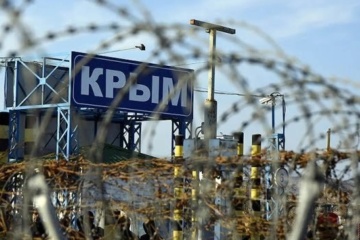The Kremlin is preparing a “reset” in the temporarily occupied Crimea: who is the escalating confrontation between?
5 November 18:33
The confrontation between Moscow and local collaborators’ elites is escalating on the temporarily occupied peninsula, the National Security and Defense Council’s Center for Countering Disinformation reports , "Komersant Ukrainian".
According to the CPC, the Kremlin is preparing a redistribution of power in the temporarily occupied Crimea, where the conflict for control over financial flows and administrative positions is deepening.
Who is against whom
The key figure in the internal struggle is the so-called “head of the republic” Sergei Aksyonov, who has been heading the occupation administration of the temporarily occupied Crimea since 2014.
According to the CPJ, his position has been shaken by a series of publications about large-scale corruption, criminal connections, and business raiding on the peninsula.
The initiator of the media campaign against Aksyonov was former State Duma deputy Ruslan Balbek, but he was later subjected to repression himself – he was detained after the intervention of Aksyonov and the Crimean FSB office.
What is happening in Moscow
According to the Center, Aksyonov was summoned to Moscow “on the carpet” where he was given a “preventive conversation” over the embezzlement of federal funds.
The move, analysts say, has fueled rumors of his possible removal.
The Kremlin is considering appointing a new “leader” – Yuriy Gotzanyuk, a collaborator who has the support of some local “deputies” and is considered a more manageable figure for Moscow.
What is behind the conflict
In fact, it is a struggle between the Crimean “old-timers of the occupation” and Moscow officials for control over the financial flows coming to the peninsula from the Russian federal budget.
The CPJ believes that the crisis within the occupation administration shows the fragility of the governance system created by Russia after the annexation in 2014.
What it could mean
According to Ukrainian analysts, the internal struggle of collaborators may be a harbinger of political changes in the temporarily occupied Crimea.
The split among the occupation elites, the growth of corruption scandals, and Moscow’s interference demonstrate that the Kremlin’s control over the peninsula is becoming less and less stable.
In October, the SBU served suspicion notices to two of Aksyonov’s associates who had set up branches of Kremlin propaganda media in occupied Crimea.
The occupation authorities regularly refuse to allow Crimeans to apply for housing and land, giving preference to members of the “Svoboda”.
Analysts have previously noted that internal conflicts among Crimean collaborators have intensified after Russia’s losses at the front and the reduction of budget funding for the region.









